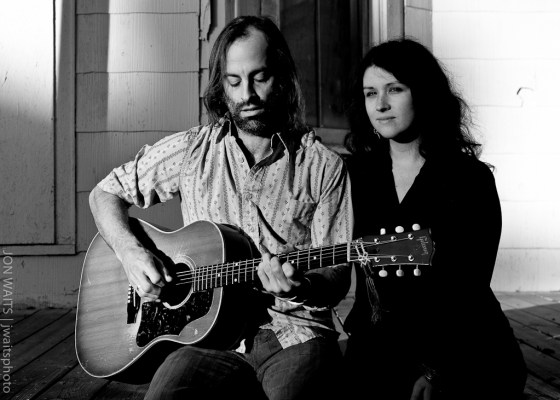Pretend Sweethearts (Drew de Man & Brianna Blackbird) — once based in Portland, Oregon but having strong ties to the Atlanta music scene — recently toured across the country, along the way stopping in Savannah and performing at Foxy Loxy Cafe’s Acoustic Tuesday. I asked them to answer a series of questions aimed at giving them a voice beyond their lyrics, and spent several days shooting images of the duo. In this piece are just a few of the photos and a five question Q & A.
HL: Has music always been a part of both of your lives, and where/when did that ‘experience’ begin for both of you? Part two of this question would be what previous bands and/or other writing history do you have.
Drew: yes, music always. I remember when my Mom found me humming to myself ceaselessly on the bottom shelf of the linen closet, just spacing out while my head vibrated with my soul’s own music. She had been looking for me for a while and I never could say how long I might have been thus engaged. I started guitar at ten, took an interest in blues and country and roots music. Had a band called No River City that was good enough to open for Calexico, Alejandro Escovedo and Iron & Wine. I was in my late 20’s when it got going and I had a blast touring the country.
Bri: At five, I took my brother’s piano teacher into my backyard and told her to convince my parents I needed to start piano right away. Singing in choirs and chorus and learning classic rock tunes. My dad was a music teacher and thought The Band was tops, up there with the Beatles. When I was 24-25 I had a little band called Dreaming in Colors in Portland, before I met Drew.
HL: What is your creative process for writing, and do you co-write much of your material or is there one primary songwriter?
PS: We do co-write a lot. It’s an easy process for us to sing lines back and forth or write them out and then sing them. Drew sent me some lyric ideas in a text while he was touring with another band a couple summers ago and it became “Honey, Please Rain”. We read each other’s minds and come up with these juicy harmony parts while we’re writing, so the melodies even take shape in tandem.
HL: While you’re known as an Americana/roots/country act is that how you would describe your songwriting as well, and do you find it limiting to be pigeonholed by such labels?
PS: We just recognize that people reach for easy touchstones when for when they’re sticking their heads into the music clouds. We have some terms we like to use, like “mystical hobo folk music” or “anarchist gospel music”. Americana is such a loose category. It isn’t exactly offensive to be pigeonholed, but it’s problematic. I think we’re both so conscientious that we’re particularly wary of the assumptions we, or anyone else, might make about anything. Then there’s the layer of commodification and commercialism that necessitates all the categorization, so….
HL: Many of your songs touch on a sometimes darker side of life. Are they autobiographical, or more metaphorical in nature?
PS: We like to go to some dark places. We’ve tried to be as uplifting as we can be. It’s part of our work as artists in the world to bear witness and speak out. So we’re really drawn to writing songs about difficult material – addiction, social inequality, personal and collective suffering.
Drew: I am always trying not to be too literal. I want images and metaphors instead of “straight” storytelling. I like lyric poetry. I also like fiction as much as truth-telling.
Bri: Rilke encourages us to dig deep to find our truth – to make art of slow, patient, even difficult processes. We are making art the whole time – out of our lives and actions. In the end, our strongest songs are really grounded in our truth.
HL: With Pretend Sweethearts leaving the country to reside in Bolivia for a period of time, are you planning on continuing to write & record in this similar vein (Americana), or do you think that immersion in another culture will change your sound? What made you want to move overseas? Why Bolivia?
Drew: Well, I will likely be the only pedal steel player in Bolivia and I hope people dig its uniqueness in South America. I think we can work on grafting some South American folk music and popular song onto our own musical tree. I learned to play accordion in Bolivia, many years ago — it was a formative musical experience, and I’m sure there’s more to discover.
Bri: We wanted to raise our kids in a different environment — away from all the screen time and consumerism of the US. Bolivians have struggled a long time to get to a politically just and equitable moment for themselves as a people. There are some really encouraging signs of what “progress” might look like for the Global South. It’s an exciting time to be there and I doubt we could escape some rich artistic influence from being there, with the people we’ll be among.





